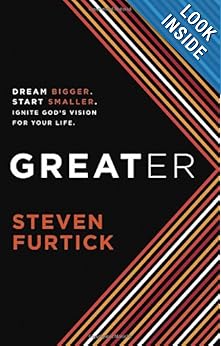
Greater by Steven Furtick
This book by Pastor Steven Furtick is a book designed to
give greater purpose and meaning to believers as they long for something more
in their lives. Based on John 14:12,
Furtick writes, “He’s (Jesus)calling us to be greater with Him through His Spirit
within us” (5). The goal isn’t to be
greater than Jesus but to be a part of how God is doing extraordinary things
through us. I agree with Steven that the
big thing that Christians are in danger is of wasting their lives. Overall, there were some really good points
that Furtick makes in this book alongside some troubling sections. The places where Steven really drew me into
the book was the way he used a series of questions to get at the heart of his
point.
After walking through the life of Elisha in the Book of
Kings, Steven examines what it means to find your calling. The ways that believers might find their
calling are unique and come in a myriad of ways. Steven writes, “Is there a message that seems
to be hitting you upside the head over and over again” (34)? How does the experiences and people around
you confirm or deny the calling on your life?
Steven is careful to not fit the calling of a believer for greater to
fit a common stock example, but notices that a person who is willing in faith
to follow this calling is headed down the right path. As Elijah threw his cloak over the head of
Elisha, Elisha knew that something other than pulling an oxen was in store for
him, and he pursued this in faith.
Steven’s section on the God who doesn’t do details was a
very unique way of seeing God’s work in our lives. The point is not that God doesn’t know all
the details or carry out these details but that He doesn’t give us a blueprint
for every detailed decision he is going to make in our lives. Steven writes, “But as you obey, you’ll be
placing the results in the hands of a God who knows every detail and who has a
contingency for every circumstance you’ll ever face” (45). Stepping out in faith is not an act in
tomfoolery because we know that God is orchestrating all these events in our
lives for his glory and our good. Our
lack of knowledge in understanding the how and why’s of God’s workings can
often lead us into doubting waters where we shake a fist at the Almighty. Yet, ‘God never makes up anything as He goes
along,’ but has a plan at every step for our lives (45).
There were many times where I think Steven stretched the
biblical passages relating Elisha too much and made much of novel
interpretations. I don’t recommend
following Steven’s interpretations on Elisha, but one can consider them for
yourself. Secondly, I wonder if this
overemphasis on doing greater things might actually hinder people from living
the ordinary life of obedience in ordinary ways. If we understand Steven’s concept as
following Jesus in obedience in a greater way even if that means in our own
worlds (work, taking care of kids, cleaning, helping neighbors, etc.), then I
agree with him. Yet, sometimes all this
talk of greater smacks askance at the lives of most Christians who struggle to
make it through each day but who desire to follow Jesus in obedience at their
demanding jobs and struggling families.
I wonder if the book might have more adequately addressed these issues
also.
Thanks to Waterbrook/Multnomah for the free copy of this
book in exchange for review.
Comments
Post a Comment